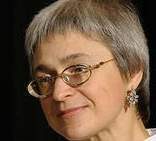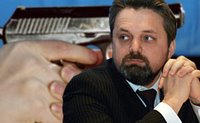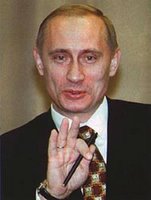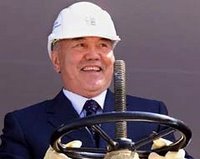 On Tuesday evening, Open Source radio broadcasted a show on "The death of Anna Politkovskaya", with myself, Masha Gessen - Deupty Editor of Bolshoy Gorod, Raffi Aftandelian - maaskva: nashimi glazami, and Edward Lucas, The Economist Central and East European Correspondent. The programme in full will, in due course, be available for download at OpenSource, but in the meanwhile, it will have to suffice with their presentation of the show:
On Tuesday evening, Open Source radio broadcasted a show on "The death of Anna Politkovskaya", with myself, Masha Gessen - Deupty Editor of Bolshoy Gorod, Raffi Aftandelian - maaskva: nashimi glazami, and Edward Lucas, The Economist Central and East European Correspondent. The programme in full will, in due course, be available for download at OpenSource, but in the meanwhile, it will have to suffice with their presentation of the show:What did she know about Putin’s Russia that we don’t? Politkovskaya was murdered in Moscow this week, shot on the street. A journalist, she spent the last seven years as a columnist for Novaya Gazeta, covering Chechnya and the oligarchs and the list of official sins that continues to grow in Putin’s Russia. She titled collections of her columns Putin’s Russia, A Dirty War and A Small Corner of Hell; it’s not hard to figure out why she made a lot of people uncomfortable.
She had a lot of enemies, they all had motives, and the threat isn’t limited to her. Russian journalist Masha Gessen revealed on the phone this afternoon that, given the choice between a lighthearted piece for a Russian paper on the economy or a more sober look at Putin for an American paper, she’d take the economy. Safer that way.
Several guests we spoke to this afternoon described Politkovskaya as “passionate”; she opened her 2004 book Putin’s Russia with the words “These are my emotional reactions, jotted down in the margins of life as it is lived in Russia today.” She established her own credibility; she was asked to help negotiate the hostage crisis in Beslan and then — she believed — poisoned on the plane on the way down. After the crisis, when it became illegal to sell a newspaper within a hundred meters of a subway entrance or bus stop, she was one of the few fearless journalists left; The Economist described her in an obit on Sunday as brave beyond belief.
And now she’s gone. What does this say about Putin’s Russia? Was an oligarch — or a Chechen, or police sergeant exposed for corruption — angry at what she’d done to his image, or did the Kremlin send a signal? And as we focus our attention on the Middle East, Russia threatens European natural gas supplies and rounds up Georgians as “criminals” for export back to Georgia. Are we completely missing a serious and not-so-new problem?
In these days, the negative attitudes towards Russia dominate. At the same time, Politkovskaya's murder may prove a turning-point for Russia. Although, there were only familiar faces - old soviet dissidents in their seventies - at her funeral yesterday, her death may actually rejuvenate the civil rights movement in Russia.
In 1966, the trial against Danilov and Sinyavsky set off a spark that ignited the soviet dissident movement of the 1970s - Andrei Sakharov, Yelena Bonner and others. Nobody could then fully grasp the significance of a few "lost souls" in the quagmire of Brezhnevite soviet society. Still, the perseverance of the dissidents inspired others and eventually led to the era of glasnost and perestroika of the 1980s.
Today, the murder of Anna Politkovskaya may inspire a young generation of "new Russians" to gradually look beyond self-interest when confronted by mounting oppression. Regrettably, oppression is the situation for Russian media today, and journalists fear for their lifes and far too many try to avoid sensitive subjects, while they otherwise risk the necks of themselves and their families. Still, perhaps it has to become worse before it becomes better.
Perhaps, Anna Politkovskaya's death will become the start of something new in Russia. That would be a testimony worthy of her bravery and moral standing as an independent journalist and a whistleblower on all the injustices prevailing in Russia of today. Anna Politkovskaya was an inspiration when she lived. Now her legacy may become an even greater inspiration for future Russia. Her mission was to fight injustices. Her vision was a better Russia - a Russia which the people deserves but must fight hard to attain. Her final sacrifice must not be in vain!

Comment: The show in full may be listened to at Open Source Radio.

 Чудовищное убийство Анны Политковской – это трагедия не только для России, но и для многих друзей России, борцов за права человека, а также для зарубежных коллег-журналистов. Анна часто приезжала к нам в Швецию. За три недели до этого трагического события она приняла участие в семинаре, состоявшемся неподалеку от Стокгольма, и мы с нетерпением ожидали ее следующего визита. Несмотря на мировую известность, она была непритязательным человеком, внимательным и терпеливым слушателем, хотя наши вопросы часто были наивны.
Чудовищное убийство Анны Политковской – это трагедия не только для России, но и для многих друзей России, борцов за права человека, а также для зарубежных коллег-журналистов. Анна часто приезжала к нам в Швецию. За три недели до этого трагического события она приняла участие в семинаре, состоявшемся неподалеку от Стокгольма, и мы с нетерпением ожидали ее следующего визита. Несмотря на мировую известность, она была непритязательным человеком, внимательным и терпеливым слушателем, хотя наши вопросы часто были наивны.














